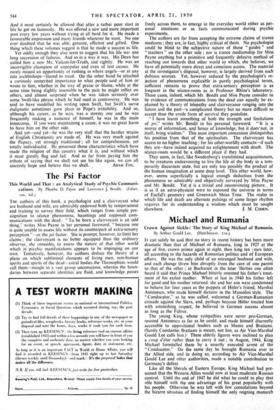The Psi Factor
THE authors of this book, a psychologist and a clairvoyant wild are husband and wife, are admirably endowed both by temperament and training to survey their field, which ranges from simple pre- cognition to séance phenomena, hauntings and supposed com- munications with the dead. "To be born a clairvoyant is an odd thing," writes Miss Payne in her personal foreword, " because one is quite unable to assess life without its counterpart of extra-sensory perception "—or the psi factor. She is prompt, however, to limit her claims ; the clairvoyant is no better equipped than the ordinary observer, she concedes, to assess the nature of that other world which in psychic manifestations appears to be impinging on our own. Tentatively, however, the authors deduce the theory of a plane on which subliminal elements of living men, non-human spirits and spirits of the dead—astral bodies the Theosophists would call them—mingle in a vast group unconscious, wherein the boun- daries between separate identities are fluid, and knowledge passes freely across them, to emerge in the everyday world either as per- sonal intuitions or as facts communicated during psychic experiments.
The authors are far from accepting the extreme claims of trance mediums ; they are, in fact, highly critical of them. No psychologist could be blind to the subjective nature of those " guides " and " teachers " on the other side ; nor is trance mediumship for Miss Payne anything but a primitive and frequently delusive method of reaching out towards that other world to which, she believes, we have all potentially more direct and conscious access. The material at the investigator's disposal, however, is largely derived from such dubious sources. Yet, however reduced by the psychologist's re- jection of phenomena explicable in purely psychological terms, sufficient remains to prove that extra-sensory perception is as frequent in the séance-room as in Professor Rhine's laboratory. Those cases, indeed, which Mr. Bendit and Miss Payne consider to be evidence of communications from the dead can equally be ex- plained by a theory of telepathy and clairvoyance ranging into the future and the past—a complicated theory but no more difficult to accept than the crude form of survival they postulate.
" I have learnt something of both the strength and limitations of psi," writes Mr. Bendit in his personal foreword. " It is a source of information, and hence of knowledge, but it does•not, in itself, bring wisdom." This most important concession distinguishes his position from that of the spiritualists. The clairvoyant has access to no higher teaching ; for his other-worldly contacts—if such they are—have indeed acquired no enlightenment with death. The séance-room would be a different place if they had.
They seem, in fact, like Swedenborg's transliminal acquaintances, to be creatures endeavouring to live the life of the body in a tem- porarily discarnate state, but are only too possibly the product of the human imagination at some deep level. This other world, how- ever, seems superficially a logical enough deduction from the phenomena so admirably and objectively surveyed by Miss Payne and Mr. Bendit. Yet it is a trivial and unconvincing picture._ It is as if an astro-physicist were to expound the universe in terms of Euclid's geometry and Greenwich Mean Time. The realm in which life and death are alternate pulsings of some larger rhythm requires for its understanding a wisdom which must be sought






































 Previous page
Previous page